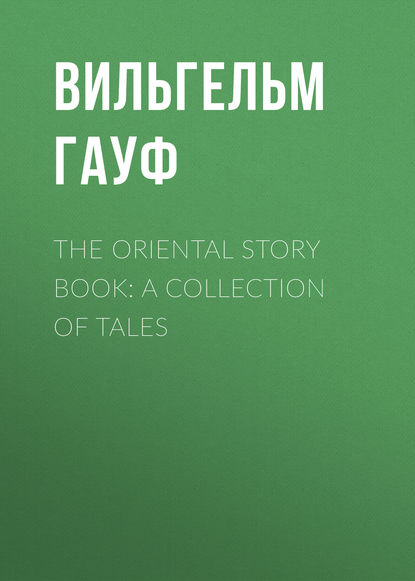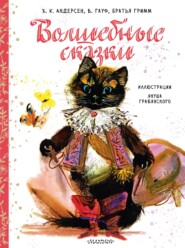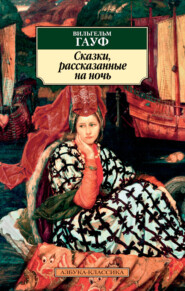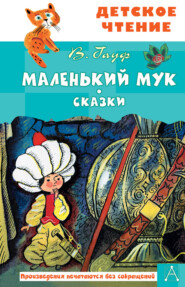По всем вопросам обращайтесь на: info@litportal.ru
(©) 2003-2025.
✖
The Oriental Story Book: A Collection of Tales
Настройки чтения
Размер шрифта
Высота строк
Поля
Little Muck, whom one night in his dungeon had deprived of all desire for further confinement, acknowledged that his whole art lay in the slippers; nevertheless, he informed not the king of the wonderful effect of turning three times upon the heel. The king put on the slippers, himself, in order to make the experiment, and ran, like mad, through the garden; often did he wish to hold up, but he knew not how to bring the slippers to a halt, and Muck, who could not deny himself this revenge, let him run on, until he fell down exhausted.
When the king returned to consciousness, he was terribly angry at Little Muck, who had suffered him to run until so entirely out of breath. “I have promised thee thy freedom and life,” said he, “but within twelve hours must thou leave my land; otherwise will I have thee hung.” The slippers and cane, however, he commanded them to bear to his treasure-chamber.
Thus, poor as ever, wandered the little fellow forth through the land, cursing the folly which had led him astray, and prevented his playing an important part at court. The land from which he was banished, was fortunately not extensive, and accordingly eight hours brought him to the frontier; but travelling, now that he was used to his dear slippers, came very hard to him. Having arrived at the border, he chose the usual road for reaching the most lonely part of the forest, for he hated all men, and resolved to live there by himself. In a thick portion of the wood, he lighted on a place, which seemed to him quite suitable for the resolution he had taken. A clear brook, surrounded by large shady fig-trees, and a soft turf, invited him: he threw himself down, determined to taste food no more, but calmly to await his end. Amid his sorrowful reflections on death, he fell asleep; when he awoke, he was tormented by hunger, and began to think that starving to death was rather an unpleasant affair; so he looked around to find something to eat.
Fine ripe figs hung upon the tree beneath which he had slept; he stretched forth his hand to pluck some; their taste was delicious, and then he descended into the brook to slake his thirst. But what was his horror, when the water showed his head adorned with two immense ears, and a long thick nose! Amazed, he clapped his hands upon his ears, and they were really more than half an ell long.
“I deserve ass’s ears!” he exclaimed; “for, like an ass, have I trodden Fortune under my feet.” He wandered around among the trees, and feeling hunger again, was obliged to have recourse once more to the fig-tree, for he could find nothing else that was eatable. After the second portion of figs, it struck him that if his ears could find room beneath his large turban, he would not look so ridiculous, and, on trying it, he found that his ears had vanished. He ran straight back to the stream, in order to convince himself thereof; it was actually so; his ears had resumed their original figure, his long misshapen nose was no more! He soon perceived how all this had happened; from the first fig-tree he had received the long nose and ears, the second had relieved him of them: he saw with joy that kind destiny yet again placed in his hands the means of becoming fortunate. He plucked, therefore, from each tree as many figs as he could carry, and went back to the land which shortly before he had left. There, in the first town, he disguised himself by means of different garments; then, turning again to the city inhabited by the king, he soon arrived at it.
For about a year ripe fruit had been quite scarce; Little Muck, therefore, placed himself before the gate of the palace, for from his former residence there, it was well known to him, that here such rareties would be purchased by the kitchen-master for the royal table. Muck had not long been seated, when he saw that dignitary walking across the court-yard. He examined the articles of the traders who had placed themselves at the palace-gate; at length his eye fell upon Muck’s little basket.
“Ah! a dainty morsel!” said he, “which will certainly please his majesty: what wish you for the whole basket?” Muck set a high price upon them, and the bargain was soon struck. The kitchen-master gave the basket to his slave, and went his way: meantime Little Muck stole away, for he feared, when the change should show itself on the heads of the court, that he, as the one who sold them, would be sought for punishment.
At table the king was well pleased, and praised his kitchen-master more than ever, on account of his good kitchen, and the care with which he always sought the rarest morsels for his table; the officer, however, who well knew what dainties he had in the back-ground, smiled pleasantly, and let fall but few words: “The day is not all past till evening,” or “End good, all good;” so that the princesses were very curious to know what he would still bring on. The moment, however, he had the fine, inviting figs set upon the table, a universal “Ah!” escaped the lips of those who were present. “How ripe! how delicate!” exclaimed the king; “kitchen-master, thou art a whole-souled man, and deservest our peculiar favor!” Thus speaking, the king, who with such choice dishes took care to be very sparing, with his own hands distributed the figs around the table. Each prince and princess received two; the ladies of the court, the Viziers and Agas, each one; the rest he placed before himself, and began to swallow them with great delight.
“In the name of heaven, father, why lookest thou so strange?” suddenly exclaimed the Princess Amarza. All gazed in astonishment upon the king; vast ears hung down from his head, a long nose stretched itself bridge-like, over above his chin; upon themselves also they looked, one upon another, with amazement and horror; all, more or less, were adorned with the same strange headdress.
The horror of the court may be imagined. All the physicians in the city were immediately sent for; they came with a blustering air, prescribed pills and mixtures, but ears and noses remained. They operated on one of the princes, but the ears grew out again.
From the place of concealment into which he had withdrawn, Muck had heard the whole story, and perceived that it was now time for him to commence operations. He had already, with the money obtained by the sale of his figs, procured a dress which would represent him as a learned man; a long beard of goat’s hair completed the illusion. With a small sack full of figs he repaired to the royal palace, and offered his assistance as a foreign physician. At first they were quite incredulous; but when Little Muck gave a fig to one of the princes, and thereby restored ears and nose to their original shape, then were all eager to be cured by the stranger. But the king took him silently by the hand, and led him to his apartment; then, opening a door that led into the treasure-chamber, he made signs to Muck to follow.
“Here are my treasures,” said the king; “choose for thyself: whatever it may be, it shall be thine, if thou wilt free me from this shameful evil.” This was sweet music in the ears of Little Muck: at the moment of entering he had seen his slippers standing upon the floor, and hard by lay his little staff. He moved around the room, as if in wonder at the royal treasures; but no sooner had he reached his beloved shoes, than he hastily slipped into them, and seizing the little cane, tore off his false beard, and displayed to the astonished king the well-known countenance of his exiled Muck.
“False king!” said he, “who rewardest faithful service with ingratitude, take, as well-deserved punishment, the deformity which thou now hast. The ears I leave thee, that, each day they may remind thee of Little Muck.” Having thus spoken, he turned quickly around upon his heel, wished himself far away, and before the king could call for help Little Muck had vanished. Ever since, he has lived here in great affluence, but alone, for men he despises. Experience has made him a wise man—one who, though there is something offensive in his exterior, deserves rather your admiration than your ridicule.
Such was my father’s story. I assured him that I sincerely repented of my behavior towards the good little man, and he remitted the other half of the punishment which he had intended for me. To my comrades I told the wonderful history of the dwarf, and we conceived such an affection for him, that no one insulted him any more. On the contrary, we honored him as long as he lived, and bowed as low to him as to Cadi or Mufti.
The travellers determined to rest a day in this caravansery, in order to refresh themselves and their beasts for the rest of their journey. The gayety of the day before again prevailed, and they diverted themselves with various sports. After the meal, however, they called upon the fifth merchant, Ali Sizah, to perform his duty to the rest, and give them a story. He answered, that his life was too poor in remarkable adventures for him to relate one connected therewith, but he would tell them something which had no relation to it: “The story of the False Prince.”
THERE was once an honest journeyman tailor, by name Labakan, who learned his trade with an excellent master in Alexandria. It could not be said that Labakan was unhandy with the needle; on the contrary, he could make excellent work: moreover, one would have done him injustice to have called him lazy. Nevertheless, his companions knew not what to make of him, for he would often sew for hours together so rapidly that the needle would glow in his hand, and the thread smoke, and that none could equal him. At another time, however, (and this, alas! happened more frequently,) he would sit in deep meditation, looking with his staring eyes straight before him, and with a countenance and air so peculiar, that his master and fellow-journeymen could say of his appearance nothing else than, “Labakan has on again, his aristocratic face.”
On Friday, however, when others quietly returned home from prayers to their labor, Labakan would come forth from the mosque in a fine garment which with great pains he had made for himself, and walk with slow and haughty steps through the squares and streets of the city. At such times, if one of his companions cried, “Joy be with thee!” or, “How goes it, friend Labakan?” he would patronizingly give a token of recognition with his hand, or, if he felt called upon to be very polite, would bow genteelly with the head. Whenever his master said to him in jest, “Labakan, in thee a prince is lost,” he would be rejoiced, and answer, “Have you too observed it?” or, “I have already long thought it.”
In this manner did the honest journeyman tailor conduct himself for a long time, while his master tolerated his folly, because, in other respects, he was a good man and an excellent workman. But one day, Selim, the sultan’s brother, who was travelling through Alexandria, sent a festival-garment to his master to have some change made in it, and the master gave it to Labakan, because he did the finest work. In the evening, when the apprentices had all gone forth to refresh themselves after the labor of the day, an irresistible desire drove Labakan back into the workshop, where the garment of the sultan’s brother was hanging. He stood some time, in reflection, before it, admiring now the splendor of the embroidery, now the varied colors of the velvet and silk. He cannot help it, he must put it on; and, lo! it fits him as handsomely as if it were made for him. “Am not I as good a prince as any?” asked he of himself, as he strutted up and down the room. “Has not my master himself said, that I was born for a prince?” With the garments, the apprentice seemed to have assumed quite a kingly carriage; he could believe nothing else, than that he was a king’s son in obscurity, and as such he resolved to travel forth into the world, leaving a city where the people hitherto had been so foolish as not to discover his innate dignity beneath the veil of his inferior station. The splendid garment seemed sent to him by a good fairy; resolving therefore not to slight so precious a gift, he put his little stock of money in his pocket, and, favored by the darkness of the night, wandered forth from Alexandria’s gates.
The new prince excited admiration everywhere upon his route, for the splendid garment, and his serious majestic air, would not allow him to pass for a common pedestrian. If one inquired of him about it, he took care to answer, with a mysterious look, that he had his reasons for it. Perceiving, however, that he rendered himself an object of ridicule by travelling on foot, he purchased for a small sum an old horse, which suited him very well, for it never brought his habitual quiet and mildness into difficulty, by compelling him to show himself off as an excellent rider, a thing which in reality he was not.
One day, as he was proceeding on his way, step by step, upon his Murva, (thus had he named his horse,) a stranger joined him, and asked permission to travel in his company, since to him the distance would seem much shorter, in conversation with another. The rider was a gay young man, elegant and genteel in manners. He soon knit up a conversation with Labakan, with respect to his whence and whither, and it turned out that he also, like the journeyman tailor, was travelling without purpose, in the world. He said his name was Omar, that he was the nephew of Elfi Bey, the unfortunate bashaw of Cairo, and was now on his way to execute a commission which his uncle had delivered to him upon his dying-bed. Labakan was not so frank with respect to his circumstances; he gave him to understand that he was of lofty descent, and was travelling for pleasure.
The two young men were pleased with each other, and rode on in company. On the second day, Labakan interrogated his companion Omar, respecting the commission with which he was charged, and to his astonishment learned the following. Elfi Bey, the bashaw of Cairo, had brought up Omar from his earliest childhood; the young man had never known his parents. But shortly before, Elfi Bey, having been attacked by his enemies, and, after three disastrous engagements, mortally wounded, was obliged to flee, and disclosed to his charge that he was not his nephew, but the son of a powerful lord, who, inspired with fear by the prophecy of his astrologer, had sent the young prince away from his court, with an oath never to see him again until his twenty-second birthday. Elfi Bey had not told him his father’s name, but had enjoined upon him with the greatest precision, on the fourth day of the coming month Ramadan, on which day he would be two-and-twenty years old, to repair to the celebrated pillar El-Serujah, four days’ journey east of Alexandria: there he should offer to the men who would be standing by the pillar, a dagger which he gave him, with these words, “Here am I, whom ye seek!” If they answered, “Blessed be the Prophet, who has preserved thee!” then he was to follow them—they would lead him to his father.
The journeyman tailor, Labakan, was much astonished at this information; from this time he looked upon Prince Omar with envious eyes, irritated because fortune conferred upon him, though already he passed for the nephew of a mighty bashaw, the dignity of a king’s son; but on him, whom she had endowed with all things necessary for a prince, bestowed in ridicule, an obscure lineage, and an every-day vocation. He instituted a comparison between himself and the prince. He was obliged to confess that the latter was a man of very lively aspect; that fine sparkling eyes belonged to him, a boldly-arched nose, a gentlemanly, complaisant demeanor, in a word, all the external accomplishments, which every one is wont to commend. But numerous as were the charms he found in his companion, still he was compelled to acknowledge to himself, that a Labakan would be no less acceptable to the royal father than the genuine prince.
These thoughts pursued Labakan the whole day; with them he went to sleep in the nearest night-lodgings; but when he awoke in the morning, and his eye rested upon Omar sleeping near him, who was reposing so quietly, and could dream of his now certain fortune, then arose in him the thought of gaining, by stratagem or violence, what unpropitious destiny had denied him. The dagger, the returning prince’s token of recognition, hung in the sleeper’s girdle; he softly drew it forth, to plunge it in the breast of its owner. Nevertheless, the peaceable soul of the journeyman recoiled before thoughts of murder; he contented himself with appropriating the dagger, and bridling for himself the faster horse of the prince; and, ere Omar awoke to see himself despoiled of all his hopes, his perfidious companion was several miles upon his way.
The day on which Labakan robbed the prince was the first of the holy month Ramadan, and he had therefore four days to reach the pillar El-Serujah, the locality of which was well known to him. Although the region wherein it was situated could at farthest be at a distance of but four days’ journey, still he hastened to reach it, through a constant fear of being overtaken by the real prince.
By the end of the second day, he came in sight of the pillar El-Serujah. It stood upon a little elevation, in the midst of an extensive plain, and could be seen at a distance of two or three leagues. Labakan’s heart beat high at the sight: though he had had time enough on horseback, for the last two days, to think of the part he was to play, still a consciousness of guilt made him anxious; the thought that he was born for a prince, however, encouraged him again, and he advanced towards the mark with renewed confidence.
The country around the pillar was uninhabited and desert, and the new prince would have experienced some difficulty in finding sustenance, if he had not previously supplied himself for several days. He lay down beside his horse beneath some palm-trees, and there awaited his distant destiny.
Towards the middle of the next day, he saw a large procession of horses and camels crossing the plain in the direction of the pillar El-Serujah. It reached the foot of the hill, on which the pillar stood; there they pitched splendid tents, and the whole looked like the travelling-suite of some rich bashaw or sheik. Labakan perceived that the numerous train which met his eye, had taken the pains to come hither on his account, and gladly would he that moment have shown them their future lord; but he mastered his eager desire to walk as prince; for, indeed, the next morning would consummate his boldest wishes.
The morning sun awoke the too happy tailor to the most important moment of his life, which would elevate him from an inferior situation, to the side of a royal father. As he was bridling his horse to ride to the pillar, the injustice of his course, indeed, occurred to him; his thoughts pictured to him the anguish of the true prince, betrayed in his fine hopes; but the die was cast: what was done could not be undone, and self-love whispered to him that he looked stately enough to pass for the son of the mightiest king. Inspirited by these reflections, he sprang upon his horse, and collecting all his courage to bring him to an ordinary gallop, in less than a quarter of an hour, reached the foot of the hill. He dismounted from his horse, and fastened it to one of the shrubs that were growing near; then he drew the dagger of Prince Omar, and proceeded up the hill. At the base of the pillar six persons were standing around an old gray-haired man, of lofty king-like aspect. A splendid caftan of gold cloth surrounded by a white Cashmere shawl, a snowy turban spangled with glittering precious stones, pointed him out as a man of opulence and nobility. To him Labakan proceeded, and bowing low before him, said, as he extended the dagger—
“Here am I, whom you seek.”
“Praise to the Prophet who has preserved thee!” answered the gray-haired one, with tears of joy. “Omar, my beloved son, embrace thine old father!” The good tailor was deeply affected by these solemn words, and sank, with mingled emotions of joy and shame, into the arms of the old noble.
But only for a moment was he to enjoy the unclouded delight of his new rank; raising himself from the arms of the king, he saw a rider hastening over the plain in the direction of the hill. The traveller and his horse presented a strange appearance; the animal, either from obstinacy or fatigue, seemed unwilling to proceed. He went along with a stumbling gait, which was neither a pace nor a trot; but the rider urged him on, with hands and feet, to a faster run. Only too soon did Labakan recognise his horse Murva, and the real Prince Omar. But the evil spirit of falsehood once more prevailed within him, and he resolved, come what might, with unmoved front to support the rights he had usurped. Already, in the distance, had they observed the horseman making signs; at length, in spite of Murva’s slow gait, having reached the bottom of the hill, he threw himself from his horse, and began rapidly to ascend.
“Hold!” cried he. “Hold! whoever you may be, and suffer not yourselves to be deceived by a most infamous impostor! I am called Omar, and let no mortal venture to misuse my name!”
Great astonishment was depicted on the countenances of the bystanders at this turn of the affair; the old man, in particular, seemed to be much amazed, as he looked inquiringly on one and another. Thereupon Labakan spoke, with a composure gained only by the most powerful effort.
“Most gracious lord and father, be not led astray by this man. He is, as far as I know, a mad journeyman tailor of Alexandria, by name Labakan, who deserves rather our pity than our anger.”
These words excited the prince almost to phrensy. Foaming with passion, he would have sprung upon Labakan, but the bystanders, throwing themselves between, secured him, while the old man said: “Truly, my beloved son, the poor man is crazed. Let them bind him and place him on one of our dromedaries; perhaps we may be of some assistance to the unfortunate.”
The anger of the prince had abated; in tears, he cried out to the old man, “My heart tells me that you are my father; by the memory of my mother, I conjure you—hear me!”
“Alas! God guard us!” answered he: “already he again begins to talk wildly. How can the man come by such crazy thoughts?” Thereupon, seizing Labakan’s arm, he made him accompany him down the hill. They both mounted fine and richly-caparisoned coursers, and rode at the head of the procession, across the plain. They tied the hands of the unfortunate prince, however, and bound him securely upon a dromedary. Two horsemen rode constantly by his side, who kept a watchful eye upon his every movement.
The old prince was Saoud, sultan of the Wechabites. For some time had he lived without children; at last a prince, for whom he had so ardently longed, was born to him. But the astrologer, whom he consulted respecting the destiny of his son, told him that, until his twenty-second year, he would be in danger of being supplanted by an enemy. On that account, in order that he might be perfectly safe, had the sultan given him, to be brought up, to his old and tried friend, Elfi Bey; and twenty-two sad years had lived without looking upon him.
This did the sultan impart to his supposed son, and seemed delighted beyond measure with his figure and dignified demeanor.
When they reached the sultan’s dominions, they were everywhere received by the inhabitants with shouts of joy; for the rumor of the prince’s arrival had spread like wildfire through the cities and towns. In the streets through which they proceeded, arches of flowers and branches were erected; bright carpets of all colors adorned the houses; and the people loudly praised God and his prophet, who had discovered to them so noble a prince. All this filled the proud heart of the tailor with delight: so much the more unhappy did it make the real Omar, who, still bound, followed the procession in silent despair. In this universal jubilee, though it was all in his honor, no one paid him any attention. A thousand, and again a thousand, voices shouted the name of Omar; but of him who really bore this name, of him none took notice: at most, only one or two inquired whom they were carrying with them, so tightly bound, and frightfully in the ears of the prince sounded the answer of his guards, “It is a mad tailor.”
The procession at last reached the capital of the sultan, where all was prepared for their reception with still more brilliancy than in the other cities. The sultana, an elderly woman of majestic appearance, awaited them, with her whole court, in the most splendid saloon of the castle. The floor of this room was covered with a large carpet; the walls were adorned with bright blue tapestry, which was suspended from massive silver hooks, by cords and tassels of gold.
It was dark by the time the procession came up, and accordingly many globular colored lamps were lighted in the saloon, which made night brilliant as day; but with the clearest brilliancy and most varied colors, shone those in the farthest part of the saloon, where the sultana was seated upon a throne. The throne stood upon four steps, and was of pure gold, inlaid with amethysts. The four most illustrious emirs held a canopy of crimson silk over the head of their mistress; and the sheik of Medina cooled her with a fan of peacock feathers. Thus awaited the sultana her husband and son; the latter she had never looked on since his birth, but significant dreams had so plainly shown her the object of her longings, that she would know him out of thousands.
Now they heard the noise of the approaching troop; trumpets and drums mingled with the huzzas of the populace; the hoofs of the horses sounded on the court of the palace; steps came nearer and nearer; the doors of the room flew open, and, through rows of prostrate attendants, hastened the sultan, holding his son by the hand, towards the mother’s throne.
“Here,” said he, “do I bring to thee, him for whom thou hast so often longed.”
The sultana, however, interrupted him, crying: “This is not my son! These are not the features which the Prophet has shown me in my dreams!”
Just as the sultan was about to rebuke her superstition, the door of the saloon sprang open, and Prince Omar rushed in, followed by his guards, whom an exertion of his whole strength had enabled him to escape. Breathless, he threw himself before the throne, exclaiming:—
“Here will I die! Kill me, cruel father, for this disgrace I can endure no longer!”
All were confounded at these words; they pressed around the unfortunate one, and already were the guards, who had hurried up, on the point of seizing him and replacing his fetters, when the sultana, who had thus far looked on in mute astonishment, sprang from the throne.
“Hold!” she cried; “this, and no other, is my son! This is he, who, though my eyes have never seen him, is well known to my heart!” The guards had involuntarily fallen back from Omar, but the sultan, foaming with rage, commanded them to bind the madman.
“It is mine to decide,” he cried with commanding tone; “and here we will judge, not by a woman’s dreams, but by sure and infallible signs. This,” pointing to Labakan, “is my son, for he has brought me the dagger, the real token of my friend Elfi.”

















